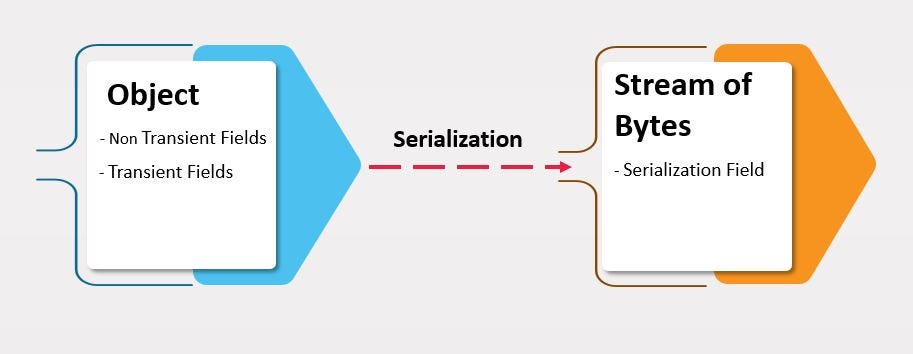How the transient Keyword Impacts Java Serialization
The transient keyword in Java is used to mark fields in a class that should not be serialized. Serialization is the process of converting an object into a byte stream, so it can be saved to a file, sent over a network, etc. When an object is serialized, all of its fields are usually saved. However, fields marked with transient are ignored during this process.

Why Use the transient Keyword?
There are several reasons why you might want to exclude certain fields from being serialized:
- Temporary or Computed Values: Some fields are temporary or calculated on the fly. These fields don’t need to be persisted or restored when deserializing the object.
- Sensitive Information: Fields like passwords, API keys, or security tokens contain sensitive data that should not be saved or shared.
- Non-Serializable Fields: Some objects, such as file streams, database connections, or thread objects, cannot be serialized. By marking these fields as transient, you avoid serialization errors.
Syntax Example:
import java.io.Serializable;
class User implements Serializable {
private static final long serialVersionUID = 1L;
String username;
transient String password;//This field won't be serialized
public User(String username, String password) {
this.username = username;
this.password = password;
}
}In this example, the password field is marked as transient, meaning it will not be serialized when the User object is written to a file or transferred.
How It Works
- Without transient: When the User object is serialized, both username and password are saved.
- With transient: The password field is skipped during serialization, meaning it will not be saved or restored when the object is deserialized.
Example of Serialization and Transient Keyword
Let’s see how this works in a real example:
import java.io.*;
class User implements Serializable {
private static final long serialVersionUID = 1L;
String username;
transient String password; // Not serialized
public User(String username, String password) {
this.username = username;
this.password = password;
}
@Override
public String toString() {
return "User [username=" + username + ", password=" + password + "]";
}
}
public class TransientExample {
public static void main(String[] args) {
User user = new User("amit_singhh", "supersecret123");
// Serialize the object
try (ObjectOutputStream oos = new ObjectOutputStream(new FileOutputStream("user.ser"))) {
oos.writeObject(user);
} catch (IOException e) {
e.printStackTrace();
}
// Deserialize the object
try (ObjectInputStream ois = new ObjectInputStream(new FileInputStream("user.ser"))) {
User deserializedUser = (User) ois.readObject();
System.out.println("Deserialized User: " + deserializedUser);
} catch (IOException | ClassNotFoundException e) {
e.printStackTrace();
}
}
}Output:
Deserialized User: User [username=amit_singhh, password=null]Explanation:
- Before serialization: User object has username and password.
- After deserialization: The username is restored, but the password field is null because it was marked transient.
When to Use the transient Keyword?
- Sensitive Information: For fields like passwords, API keys, or personal data that should not be exposed in the serialized format.
- Non-Serializable Fields: When fields like File, Socket, or Thread can't be serialized.
- Temporary/Calculated Fields: If a field is calculated dynamically, it doesn’t need to be serialized.
Real-Life Use Case
Consider a user session in a web application. You might store session data, including sensitive tokens or passwords, in memory for quick access. However, when saving the session to disk or sending it across servers, you wouldn’t want these sensitive fields to be serialized.
By marking sensitive fields like tokens as transient, you ensure they are not saved insecurely, making your application more secure.
Key Points to Remember
- The transient keyword is used to skip serialization of specific fields.
- It’s commonly used for sensitive data or non-serializable objects.
- Fields marked transient are initialized to default values (e.g., null for objects, 0 for integers) when deserialized.
By using the transient keyword, you can fine-tune which parts of your objects get serialized, helping you keep your applications secure and efficient. It’s a small but essential tool in the Java toolbox for better handling of sensitive and temporary data.
Comments
Post a Comment